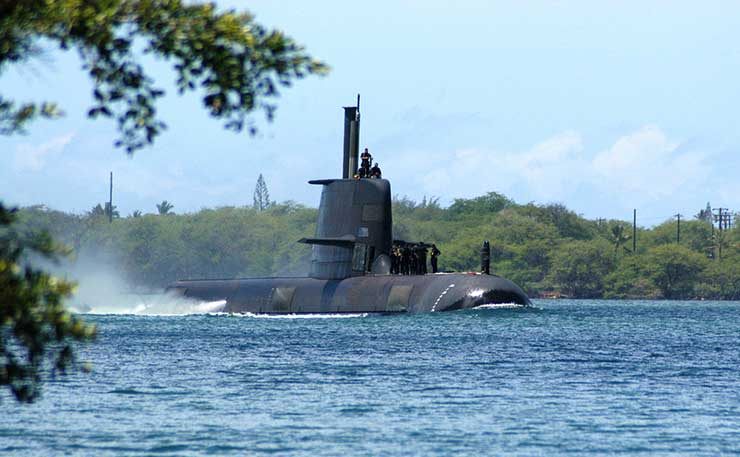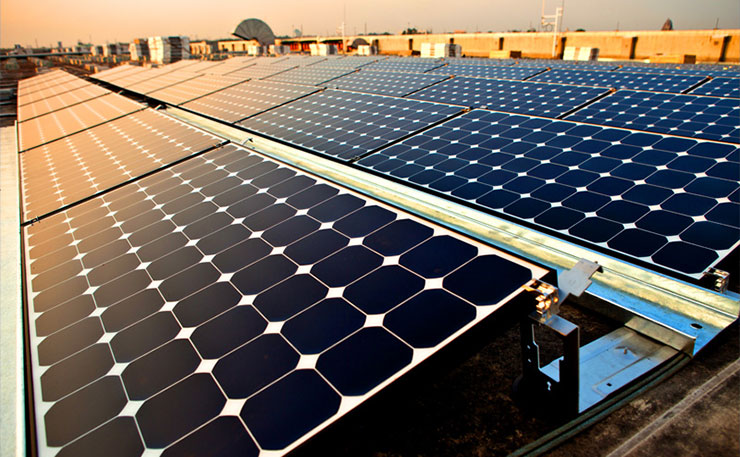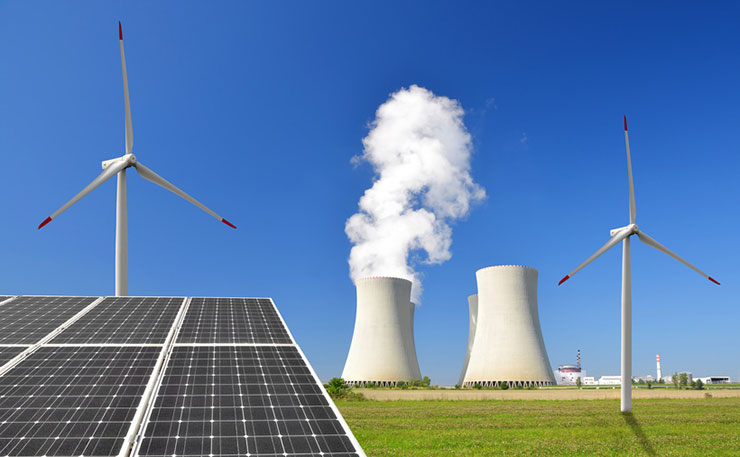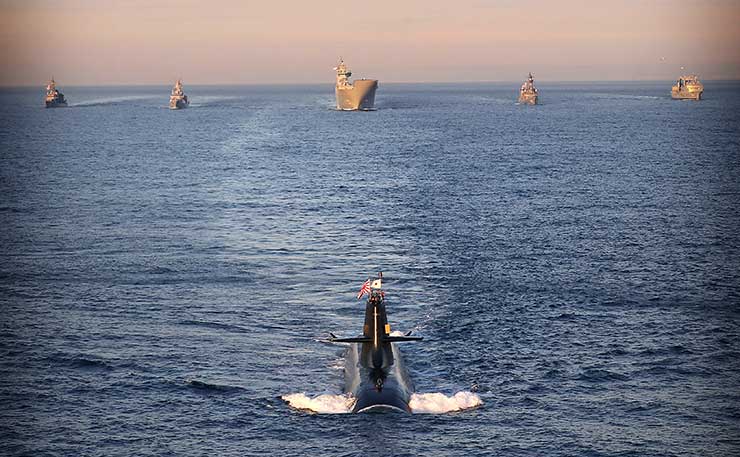The Turnbull Government’s announcement of a new fleet of submarines leaves Geoff Russell wondering how we’ll win that ‘other’ war… the one far more likely to wipe us out.
They shall not pass! … Turnbull, Morrison and Dutton are armed to the teeth and manning the barricades defending us against the militant hordes of Manus Island. Thankfully they’ll soon have help in the form of a dozen 97 metre long French submarines all sporting le slogan de jour: On ne passes pas!
But being Australian, we figured we’d save a few bucks by ordering the pedal powered version to keep our ports nuclear free, and to make a few more jobs for elderly scrum forwards with big legs.
Isn’t it fascinating. In response to some nebulous threat from across or beneath the seas, we get a few chaps who know about such things to decide our needs… I’m guessing they are all chaps, but perhaps not.
They figure we need 12 submarines; I’m guessing this is 8 to defend the nation and 4 extra to buy the next election. Then we put out a tender and a bunch of companies who know how to build submarines respond.
We pick one and they put together a team to plan and build the various components and assemble the submarines. We pay them with tax dollars.
All pretty unexceptional. Now think about our response to climate change. This is a very real threat and one thing we need is carbon free electricity to the tune of about 250 terawatt hours a year.
We could just put out a tender for this. There’s no shortage of people who can make suitable power stations… they are considerably easier to build than submarines. We could pay something up front and then the rest will come from the sale of electricity. This is much easier than paying for submarines because submarines don’t actually produce any ongoing recognisable services other than simply being there.

The only significant industrial country to almost entirely decarbonise its electricity system used a process pretty much like we are using to build submarines. And conincidentally, it was France.
They just decided what to build, and then just built ’em. It took about 15 years and they’ve had cleaner electricity for 25 years than anybody else will have until about 2050.
I’ve just been reading the ALP Climate Change Action Plan and they seem to think that a solution involves everything and anything short of actually planning or doing anything. They do, however, get full marks for lateral thinking. They propose changing the words in the National Electricity Market legislation to include a reference to “reducing carbon pollution“.
Why did nobody think of this before?
If the submarine tender people had only realised the power of words they could have done similarly by amending our Armed Forces Corporate Vision to include “underwater protection” and submarines should, in the fullness of time, eventually have magically appeared without all this tender rigmarole.
Other gems from the ALP plan include “solar gardens“. This little thought bubble allows people whose roofs are unsuitable for solar panels a chance to get their trotters in the trough of the money, usually levied from consumers without panels, that is used to subsidise this technology.

The US state of Colarado moved legislation on solar gardens in 2010 and solar has boomed; soaring to just over half of one percent of electricity production over the past 5 years (30 of the 4748 gigawatt hours used each month). I’m amazed someone hasn’t patented this stunning piece of intellectual property.
The ALP plan notes that Australian households have “overwhelmingly embraced” solar with 1.6 million homes having installed panels over the past 15 years. Where have we heard “15 years” before? That’s right, in the time it took us to install those 1.6 million solar rooftops to decarbonise a little over 2 percent of our electricity, France decarbonised about 80 percent of her electricity with nuclear reactors; and she wasn’t even trying.
But the good part about the ALP plan is that they have one.
They accept the science on climate change; even if they don’t really understand it very well. The lack of understanding is evident where they consider agriculture. Regular readers of New Matilda may recall something about methane from an article I did last year. Here’s a recap.
Anything which changes the balance between energy leaving and arriving on the planet is called a forcing. This can be a gas like CO2 or something like changing the color of house roofs which can change the amount of energy reflected back from the surface of the planet.
The Kyoto agreement simplified and butchered the science by ignoring some things that weren’t well understood, but were thought to be minor issues, like black carbon (soot from fires, diesel emissions and such). It also arbitrarily averaged the impact of all gases over a 100-year period.
This simplifies the accounting but seriously underestimates the impact of something like methane, which has an atmospheric lifetime of about 12 years before being broken down.
During those 12 years, a tonne of methane has about 100 times the impact on warming as a tonne of CO2.
Kyoto is an accounting system; it isn’t climate science. If climate scientists used Kyoto factors in their models, they’d get all the wrong answers; so they don’t!

Given the growing speed of climate deterioration, averaging methane over 100 years isn’t just wrong, but seriously misleads about how best to tackle the problem.
Back in 2008, Professor Barry Brook and I calculated that Australian cattle generate more warming than all our coal fired power stations; but we just looked at methane.
In 2015, researchers lead by a one-time Queensland Senior Government scientist, Gerard Wedderburn-Bisshop looked at all the little things ignored by Kyoto; not just methane. They found that agriculture in Australia generates 54 percent of the warming impact we will have on the climate in the next 20 years. All bar 6 percent is down to livestock.
What’s the ALP policy on reigning in livestock climate impacts? A free lunch. Part of the ALP policy of twiddling financial policy settings is the reintroduction of an emissions trading scheme… but agriculture will be exempt.
I met recently with Mark Butler, the ALP Minister responsible for this policy. He’s smart, compassionate, sincere and 100 per cent committed to dealing with climate change. Which should give everybody pause for thought.
How did we, as a society, and really as a group of societies, the Western democracies, come to this? We have a global crisis but our governments lack the capacity to act. It’s like they need to dig a bloody big hole and are competing with a range of decorative thimbles.
We don’t only know how to build submarines. We have governments that have even been known to build schools and hospitals; so what is it with power stations that puts them off limits?
Donate To New Matilda
New Matilda is a small, independent media outlet. We survive through reader contributions, and never losing a lawsuit. If you got something from this article, giving something back helps us to continue speaking truth to power. Every little bit counts.




